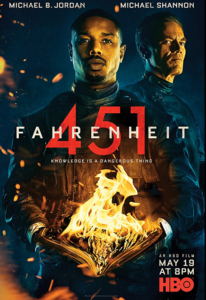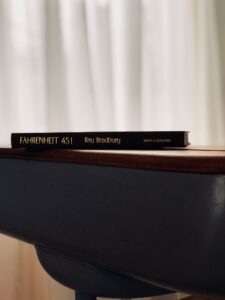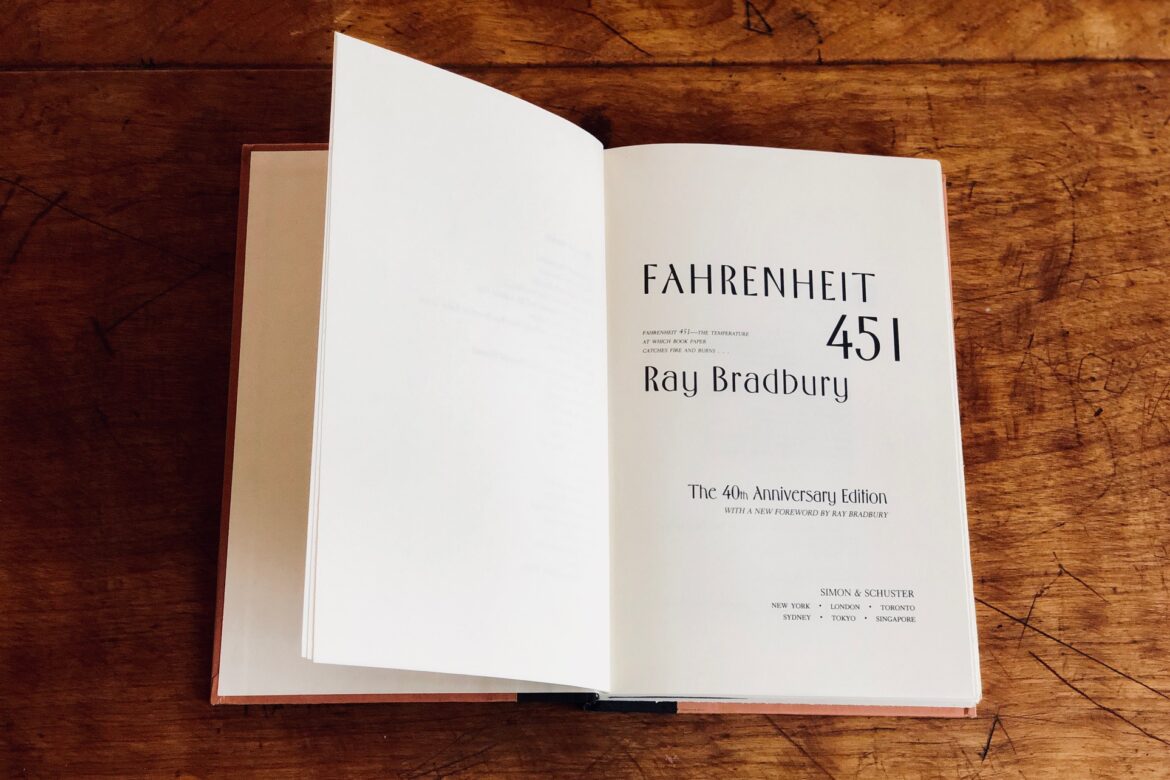What book would you memorize? If all literature was being burned forever, which tome would you commit to memory?

 HBO’s recent adaptation of Ray Bradbury’s classic novel “Fahrenheit 451” is an awful miss. This ill-conceived adaptation from director Ramin Bahrani and screenwriter Amir Naderi borrows hints from the source material, but ultimately forgets the inherent tension that so permeated it. Spoiler here, one of the devices Bradbury used was the overarching threat of nuclear war to help keep things on a constant knife’s edge. There’s none of that in Bahrani’s film.
HBO’s recent adaptation of Ray Bradbury’s classic novel “Fahrenheit 451” is an awful miss. This ill-conceived adaptation from director Ramin Bahrani and screenwriter Amir Naderi borrows hints from the source material, but ultimately forgets the inherent tension that so permeated it. Spoiler here, one of the devices Bradbury used was the overarching threat of nuclear war to help keep things on a constant knife’s edge. There’s none of that in Bahrani’s film.
In “Fahrenheit 451 (2018)” fireman Guy Montag is played by Michael B. Jordan, who we just saw as Erik Killmonger in “Black Panther.” That film gets better with every viewing, and Jordan’s tortured performance is part of its magic. He’s an actor possessing natural intensity and here he is committed to Montag, but surprisingly, Bahrani’s version casts the character as a depressed loner.
And in doing so, Bahrani’s script takes Jordon’s charisma and does absolutely nothing with it, except make it uninteresting. Montag here is a real sourpuss. Frankly, taking advantage of the way Jordan walks, the way he carries himself, the way he emotes, would have darned near carried this film. It’s just no fun to see Jordan in this role, and my mind wandered. Where’s the flash, where’s the crazed fire that made him so riveting in “Creed?” It’s not Jordan’s fault.
 Students of the novel will remember that Montag was married in the book, which provided some of the early conflict as his wife Mildred fought with an addiction to sleeping pills and her “parlor” family that was projected on the walls of their home. A key scene involves how easily she dismisses him. At one point, she can’t even remember when they met. The movie tries to do this too, making its Montag confused about his father’s past (which, I seem to remember in the novel may have involved his mother).
Students of the novel will remember that Montag was married in the book, which provided some of the early conflict as his wife Mildred fought with an addiction to sleeping pills and her “parlor” family that was projected on the walls of their home. A key scene involves how easily she dismisses him. At one point, she can’t even remember when they met. The movie tries to do this too, making its Montag confused about his father’s past (which, I seem to remember in the novel may have involved his mother).
Bradbury rightly predicted that people would abandon traditional reading in favor of television and other forms of passive entertainment. Do you have an Audible account?
The antagonist in the “Fahrenheit” story is Captain Beatty, Montag’s fire chief. It’s set in a future in which all serious literature has been outlawed. Fireman now start fires, burning illegal materials, rather than putting them out. Beatty is played in the 2018 movie by creepy cinematic stalwart Michael Shannon. Bahrani and Shannon worked together on the very good “99 Homes,” and the casting here is inspired. Bradbury, who would have likely loved Shannon in the role, wrote Beatty as a former reader, and in Bahrini’s version, Beatty has much knowledge of literature, quoting lines randomly to a puzzled Montag.
 But where the award-winning novel is broken into three sections, each artfully building on the character development that came before it, this new film is very much like an abridged version. And the Bahrani/Naderi script strips away elements that made the entire bit of fiction hang together with satiric apprehension. Therefore, there are no nuclear bombers ominously flying over the city, no robot fire station hound sniffing around, and even the walled televisions that provide Mildred her “family” have been reduced in significance.
But where the award-winning novel is broken into three sections, each artfully building on the character development that came before it, this new film is very much like an abridged version. And the Bahrani/Naderi script strips away elements that made the entire bit of fiction hang together with satiric apprehension. Therefore, there are no nuclear bombers ominously flying over the city, no robot fire station hound sniffing around, and even the walled televisions that provide Mildred her “family” have been reduced in significance.
I get that Bahrani tries to make his version of “Fahrenheit” less an action rip-off and more introspective. He abbreviates the familiar chase sequence, which is in the novel, and alters critical scenes replacing them with exposition delivered by Shannon in his cynical lip-curling drawl. It should work, but instead it’s frustrating, especially, when in passing dialogue a plot point is revealed about the plan of the exiles, which I cannot reveal because, honestly, I don’t really understand it. Having not read the book in 20 years, maybe this can be credited to Bradbury, however, I can’t remember this part of the novel. It’s all a head-scratcher, but not one worth pursuing.
Sadly, an action version of the Bradbury material would have been superior to what HBO has done with it. Something akin to Spielberg’s “Minority Report” that preserved the “ah, ha” moments would have given viewers unfamiliar with the source a reason to visit it. But instead, some of those unfortunate souls that chose to watch this dull, humorless, and unexciting adaptation will come away blaming the failure on Bradbury.
After all, the book was written back in the early 1950s and the writer passed away in 2012, right? How could a book that dated be hip enough for our modern age? It’s all a sad legacy to an iconic literary presence, who Hollywood has a hard time translating. Getting it right means understanding why the original worked, and that means preserving more than a few of the source’s ideas, it means actually adapting what is there on the written page. “Fahrenheit 451” burns so much of the novel that barely more than character names and the title remain in the ashes.

